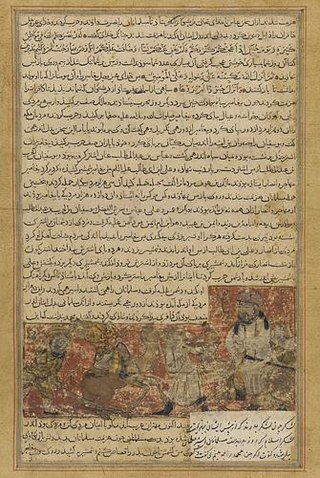Muhammad Ibn Wasi' Al-Azdi (d.ca.744 or 751) was a tabi'i Islamic scholar of hadith , judge, and soldier who was noted for his asceticism (zuhd). His statement, 'I never saw anything without seeing Allah therein' was much discussed by later Sufis. He fought under Qutaybah Ibn Muslim (d.715) during the Umayyad conquest of Transoxiana, and later became a judge.
There is a story that claims that a Muslim saw in a dream Malik Bin Deenar and Ibn Wasi being led into Jannah, and noticed that Malik was more honoured and allowed to enter first. When he enquired, noting that he believed Ibn Wasi' was the more noble, he was told that it was true, "but Mohammed ibn Wasi possessed two shirts, and Malik only one. That is the reason why Malik is preferred". [1]
Qutaybah Ibn Muslim said of him, "That the finger of Muhammad ibn Wasi' points to the sky in battle is more beloved to me than one hundred thousand renowned swords and strong youths." [2] Abu Hamid Al-Ghazali (d.1111) also mentioned him in his writings: If a man finds himself sluggish and averse from austerity and self-discipline, he should consort with one who is a proficient in such practices so as to catch the contagion of his enthusiasm. One saint used to say, "When I grow lukewarm in self-discipline, I look at Muhammad Ibn Wasi, and the sight of him rekindles my fervour for at least a week." [3] Muhammad ibn Wasi said; “Only three things do I wish for in this world; a brother to set me straight if I go crooked; a livelihood for, which I do not have to beg; and a congregational prayer in, which I am relieved of absent mindedness and, which is recorded in my favor.” [4]

Abū Bakr ʿAbd Allāh ibn ʿAbī Quḥāfa was the senior companion and was, through his daughter Aisha, a father-in-law of the Islamic prophet Muhammad, as well as the first Caliph of the Rashidun Caliphate. He is known with the honorific title al-Siddiq by Sunni Muslims.

Sufism, also known as Tasawwuf, is a mystic body of religious practice found within Islam which is characterized by a focus on Islamic purification, spirituality, ritualism, asceticism, and esotericism. It has been variously defined as "Islamic mysticism", "the mystical expression of Islamic faith", "the inward dimension of Islam", "the phenomenon of mysticism within Islam", the "main manifestation and the most important and central crystallization" of mystical practice in Islam, and "the interiorization and intensification of Islamic faith and practice".

Al-Ghazali, full name Abū Ḥāmid Muḥammad ibn Muḥammad aṭ-Ṭūsiyy al-Ġazzālīy, and known in Persian-speaking countries as Imam Muhammad-i Ghazali or in Medieval Europe by the Latinized as Algazelus or Algazel, was a Persian Sunni Muslim polymath. He is known as one of the most prominent and influential jurisconsults, legal theoreticians, muftis, philosophers, theologians, logicians and mystics in Islamic history.
An-Nuʿmān ibn Thābit ibn Zūṭā ibn Marzubān Abū Ḥanīfa al-Kūfī, commonly known as Abu Hanifa, was a Sunni Muslim scholar, theologian, jurist, writer, ascetic, and eponymous founder of the Hanafi school of Islamic jurisprudence, which remains the most widely practiced to this day. His school predominates in Central Asia, Afghanistan, Iran, Turkey, the Balkans, Russia, Circassia, Pakistan, Bangladesh, India, and some parts of the Arab world. He is often reverently referred to with the titles the Greatest Imam, Lamp of the Imams, and Shaykh of Islam.
Zayd ibn ʿAlī, also spelled Zaid, was the son of Ali ibn al-Husayn Zayn al-Abidin, and great-grandson of Ali ibn Abi Talib. He led an unsuccessful revolt against the Umayyad Caliphate, in which he died. The event gave rise to the Zaydiyya sect of Shia Islam, which holds him as the next Imam after his father Ali ibn al-Husayn Zayn al-Abidin. Zayd ibn Ali is also seen as a major religious figure by many Sunnis and was supported by the prominent Sunni jurist, Abu Hanifa, who issued a fatwa in support of Zayd against the Umayyads.
Al-Asmaʿi, or Asmai; an early philologist and one of three leading Arabic grammarians of the Basra school. Celebrated at the court of the Abbasid caliph, Hārūn al-Rashīd, as polymath and prolific author on philology, poetry, genealogy, and natural science, he pioneered zoology studies in animal-human anatomical science. He compiled an important poetry anthology, the Asma'iyyat, and was credited with composing an epic on the life of Antarah ibn Shaddad. A protégé of Al-Khalil ibn Ahmad al-Farahidi and Abu 'Amr ibn al-'Ala', he was a contemporary and rival of Abū ʿUbaidah and Sibawayhi also of the Basran school.

Muhammad ibn Abi Bakr ibn Abi Quhafa al-Taymi was an Arab Muslim commander in the service of the fourth Rashidun caliph Ali.
Amr ibn Hisham (Arabic: عَمْرو بن هِشَام, romanized: ʿAmr ibn Hishām; also known as Abū Jahl c. was the Meccan Qurayshi polytheist leader of the Mushrikites known for his opposition to the Islamic prophet Muhammad. He was the most prominent flag-bearer of opposition towards Islam.
Abū Muḥammad ʿAbd Allāh ibn Muslim ibn Qutayba al-Dīnawarī al-Marwazī better known simply as Ibn Qutaybah was an Islamic scholar of Persian descent. He served as a judge during the Abbasid Caliphate, but was best known for his contributions to Arabic literature. He was an Athari theologian and polymath who wrote on diverse subjects, such as Qur'anic exegesis, hadith, theology, philosophy, law and jurisprudence, grammar, philology, history, astronomy, agriculture and botany.

Abū ʾl-Yaqẓān ʿAmmār ibn Yāsir ibn ʿĀmir ibn Mālik al-ʿAnsī al-Maḏḥiǧī also known as Abū ʾl-Yaqẓān ʿAmmār ibn Sumayya was one of the muhajirun in the history of Islam and, for his dedicated devotion to Islam's cause, is considered to be one of the closest and most loyal companions of Muhammad and to Muslims; thus, he occupies a position of the highest prominence in Islam.

The Battle of Hunayn was a conflict between the Muslims of the Islamic prophet Muhammad and the tribe of Qays in the aftermath of the conquest of Mecca. The battle took place in 8 AH in the Hunayn valley on the route from Mecca to Taif. The battle ultimately ended in a decisive victory for the Muslims, and it is one of the few battles mentioned by name in the Qur'an, where it appears in Surat at-Tawbah.
Dhia' ul-Dīn 'Abd al-Malik ibn Yūsuf al-Juwaynī al-Shafi'ī was a Persian Sunni scholar famous for being the foremost leading jurisconsult, legal theoretician and Islamic theologian of his time. His name is commonly abbreviated as al-Juwayni; he is also commonly referred to as Imam al-Haramayn meaning "leading master of the two holy cities", that is, Mecca and Medina. He acquired the status of a mujtahid in the field of fiqh and usul al-fiqh. Highly celebrated as one of the most important and influential thinkers in the Shafi'i school of orthodox Sunni jurisprudence, he was considered as the virtual second founder of the Shafi'i school, after its first founder Imam al-Shafi'i. He was also considered a major figurehead within the Ash'ari school of theology where he was ranked equal to the founder, Imam al-Ash'ari. He was given the honorific titles of Shaykh of Islam, The Glory of Islam, The Absolute Imam of all Imams.
Abu Bakr ibn al-Arabi or, in full Abū Bakr Muḥammad ibn ʿAbdallāh ibn al-ʿArabī al-Maʿāfirī al-Ishbīlī born in Sevilla in 1076 and died in Fez in 1148) was a Muslim judge and scholar of Maliki law from al-Andalus. Like Al-Mu'tamid ibn Abbad, Ibn al-Arabi was forced to migrate to Morocco during the reign of the Almoravids. It is reported that he was a student of Al-Ghazali. He was a master of Maliki Jurisprudence. His father was a student of Ibn Hazm. He also contributed to the spread of Ash'ari theology in Spain. A detailed biography about him was written by his contemporary Qadi Ayyad, the Malikite scholar and judge from Ceuta.
Asim ibn Umar ibn al-Khattab was the son of Jamila bint Thabit and Umar ibn al-Khattab, the second Rashidun caliph. Asim was also a famous hadith scholar.
Surāqa ibn Mālik ibn Juʿshum al-Kinānī was a member of the Kinana tribe which, like its sub-tribe the Quraysh, ng their migration to Medina, hoping to win the bounty that the Quraysh had put on their heads. He was unable to stop them due to miraculous events which are viewed as divine intervention in the Islamic tradition. He later converted to Islam.
Peaking whilst in the Middle Ages, the religion of Islam has a tenuous relationship with the idea of voluntary poverty. While Sufism has encouraged the renunciation of material wealth, Sunni and Shi'ite scholars have traditionally held that self-denial is inconsistent with the Quran's admonition against those who would forbid the good that God has put in this world for his people to enjoy.
Kumayl bin Ziyad an-Nakha'i was among the most loyal companions of Imam Ali Ibn Abi Talib. Moreover, Kumayl occupies a prominent position in Shia Islam. Converting to Islam during the time of Islamic prophet Muhammad, he rose to a position of prominence during the caliphates of Uthman and Ali. In the caliphate of Ali, Kumayl flourished and served him in the most disciplined of ways. However, he is recognized for his pious and humble nature as well as preserving Imam Ali's teachings. Kumayl is best known for the du'a (supplication) of Prophet Khidr, which is commonly known by the name du'a Kumayl.
According to Islamic tradition, the Quran was revealed to the Islamic prophet Muhammad by the angel Gabriel (Jibril) in seven ahruf, translated variously as "styles", "ways", "forms" and "modes". Islamic scholars agree that the ahruf were styles used by the early Muslims to recite the Quran.
Abdallah ibn al-Musayyab ibn Zuhayr al-Dabbi was a governor of Egypt for the Abbasid Caliphate, from 792 to 793.